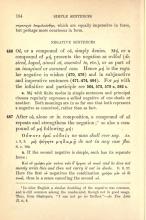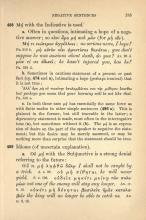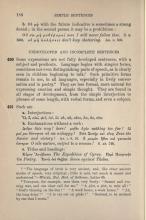486. Οὐ, or a compound of οὐ, simply denies. Μή, or a compound of μή, presents the negation as willed (desired, hoped, aimed at, assented to, etc.), or as part of an imagined or assumed case. Hence μή is the regular negative in wishes (§§ 470, 476) and in subjunctive and imperative sentences (§§ 471 – 474, 484). For μή with the infinitive and participle see §§ 564, 572, 579.a and 582.c.
a. Μή with finite modes in simple sentences and principal clauses regularly expresses a willed negative of one shade or another. Both meanings are in so far one that both represent a negative as conceived, rather than as fact.
487. After οὐ, alone or in composition, a compound of οὐ repeats and strengthens the negation;[fn]In older English a similar doubling of the negative was common, and is still common among the uneducated, though not in good usage. Thus, from Shakspere, "I can not go no further."--As Yοu Like It, II, 4.[/fn] so also a compound of μή following μή.
Οὔποτε ἐρεῖ οὐδείς.
No man shall ever say.
Xen. Anabasis 1.3.5
μὴ φύγητε μηδαμῇ.
Do not in any case flee.
Soph. Philoctetes 789
a. If the second negative is simple, each has its separate force.
Καὶ οὐ γράφει μὲν ταῦτα τοῖς δʼ ἔργοις οὐ ποιεῖ.
And he does not merely write this and then not carry it out in deeds.
Demosthenes 9.27
Here the first οὐ negatives the combination γράφει μὲν οὐ δὲ ποιεῖ, thus in a sense canceling the second οὐ.
488. Μή with the Indicative is used
a. Often in questions, intimating a hope of a negative answer; so also ἆρα μή and μῶν (for μὴ οὖν).
Μή τι νεώτερον ἀγγέλλεις;
No serious news, I hope?
Plato Protagoras 310b
μὴ αὐτὸν οἴει φροντίσαι θανάτου;
You don't suppose he was anxious about death, do you?
Plato Apology 28d
μῶν τί σε ἀδικεῖ;
He hasn't injured you, has he?
Plato Protagoras 310d
b. Sometimes in cautious statement of a present or past fact (cp. § 474 and 474.a.), intimating a hope (perhaps ironical) that it is not true.
Ἀλλʼ ἄρα μὴ οὐ τοιαύτην ὑπολαμβάνεις σου τὴν μάθησιν ἔσεσθαι.
But perhaps you mean that your learning will be not like that.
Plato Protagoras 312a–b
c. In both these uses μή has essentially the same force as with finite modes in other simple sentences (§ 486.a, above). This is plainest in the former, but still traceable in the latter; a deprecatory statement is made, most often in the interrogative tone (a), but sometimes without it (b). The μή is an expression of desire on the part of the speaker to negative the statement; but this desire may be merely assumed, or may be nothing more than surprise that the statement should be true.
489. Idioms (of uncertain explanation).
a. Οὐ μή with the subjunctive is a strong denial referring to the future.
Οὔ τι μὴ ληφθῶ δόλῳ.
I shall not be caught by a trick.
Aesch. Seven Against Thebes 38
οὐ μὴ πίθηται.
He will never yield.
Soph. Philoctetes 103
οὐδεὶς μηκέτι μείνῃ τῶν πολεμίων.
Not one of the enemy will stay any longer.
Xen. Anabasis 4.8.13
οὐκέτι μὴ δύνηται βασιλεὺς ἡμᾶς καταλαβεῖν.
The king will no longer be able to catch us.
Xen. Anabasis 2.2.12
b. Οὐ μὴ with the future indicative is sometimes a strong denial; in the second person it may be a prohibition.
Οὔ σοι μὴ μεθέψομαί ποτε.
I will never follow thee.
Soph. Electra 1052
οὐ μὴ λαλήσεις.
Don't keep chattering.
Aristoph. Clouds 505



